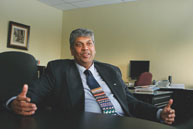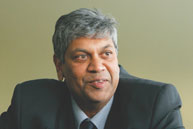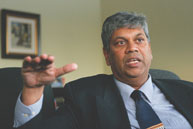Entre nous: Riding the bio-revolution wave
Entre nous: Riding the bio-revolution wave McGill University
User Tools (skip):
Entre nous with Chandra Madramootoo, Dean of Agricultural and Environmental Sciences
Chandra Madramootoo, who became Dean of Agricultural and Environmental Sciences in August 2005, will lead the faculty into its centenary year, 2006-07, and to the completion of a major infrastructural makeover, including a radically renovated library and new state-of-the-art animal facilities. These days, though, the faculty isn't confined to the Macdonald Campus.

Chandra Madramootoo has served as project leader on many large scale water and environmental research projects in Quebec, Central Asia, and the Caribbean.
Owen Egan
Agricultural and Environmental Sciences has become a research hotspot, receiving $45 million from the Canada Foundation for Innovation in recent years. How would you characterize the research effort?
Our research is very interdisciplinary, and very integrated. For instance, we have basic agricultural production in the field - animal and plant production. Not only are we harvesting these products for food and fibre, but we're investigating how we can extract value added commodities like biofuels and neutraceuticals from plants and plant products. We are working across faculties to maximize our accomplishments and this will include collaboration with the Faculty of Engineering to develop a pilot processing plant. The same thing applies in human nutrition and food science: our professors are extracting compounds and enzymes that are of interest to pharmaceutical and food companies, so we're working closely with people in the faculties of medicine and science, particularly with the McGill Nutrition and Food Science Centre. We also have people at the Institute of Parasitology researching diseases such as malaria and leishmaniasis, investigating disease control and treatments for use by humans as well as farm animals.

You were director of the Brace Centre for Water Resources Management before becoming dean, and much of your work involved environmental issues. How important is environmental research for the faculty?
Very important! We take clean air, water and land for granted. We all want to feel confident that our food is not contaminated by microbiological pollutants and chemicals. So what measures must we take to make sure we are producing healthy, safe, clean food? We cannot work in our individual silos to find solutions to problems as broad as this. These questions involve plant and animal science, environmental sustainability, health and disease and nutrition, which again requires us to work across disciplines, especially with people in science and medicine. At the Brace Centre, we're concerned with issues around water resource management, protection, drainage - all areas tied to environmental concerns, and also involving researchers from engineering and other fields. And of course, the faculty is a major player in the McGill School of Environment.

From the downtown campus, it's all too easy to think of Macdonald as a self-contained world apart from the rest of McGill. Clearly that's not the case.
Some of the collaborations we'd like to develop are less self-evident. For instance, we have a strong science base in biotechnology, and there are many biotech and life science companies out here on the West Island. While they need people trained in the sciences, they also want people who understand things like intellectual property, venture capital and patents. So here's where Macdonald can partner with the faculties of management and law to provide a more rounded program that will meet these needs.
You have a big party on the horizon - what sort of plans are you making for the centenary?
We'll have some ceremonies at Homecoming 2006, when we'll open the new library and launch our distinguished alumni awards. But we plan to use the centenary for more than celebrations. We have seen rapid advances in biotechnology, bioinformatics, biosystems, bioprocessing and other areas. We want to take advantage of these new developments, and what I call the bio-revolution, to reframe our academic offerings and to present a new face for the faculty to launch the next hundred years.

